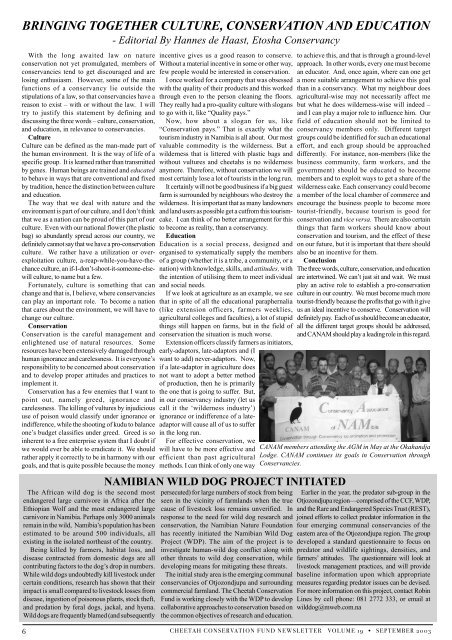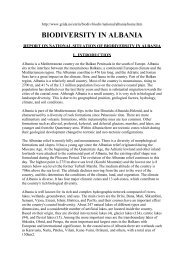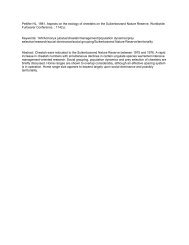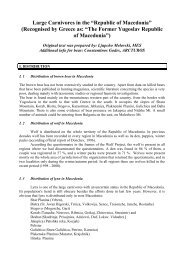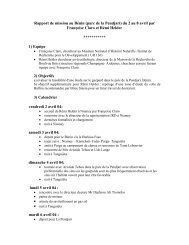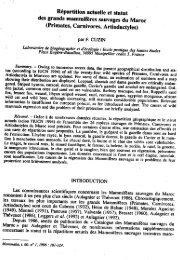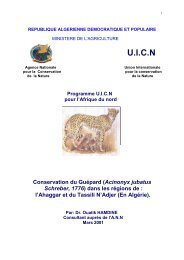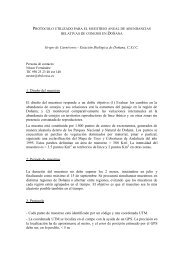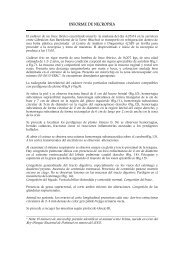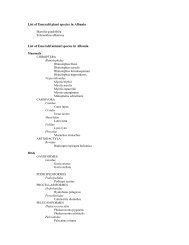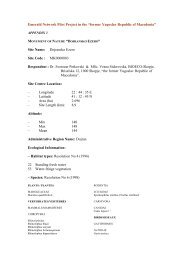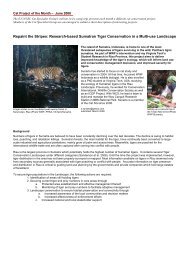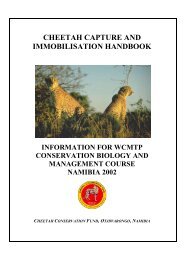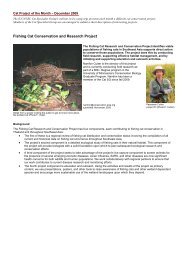CHEETAH CONSERVATION FUND - Cat Specialist Group
CHEETAH CONSERVATION FUND - Cat Specialist Group
CHEETAH CONSERVATION FUND - Cat Specialist Group
You also want an ePaper? Increase the reach of your titles
YUMPU automatically turns print PDFs into web optimized ePapers that Google loves.
BRINGING TOGETHER CULTURE, <strong>CONSERVATION</strong> AND EDUCATION<br />
- Editorial By Hannes de Haast, Etosha Conservancy<br />
With the long awaited law on nature<br />
conservation not yet promulgated, members of<br />
conservancies tend to get discouraged and are<br />
losing enthusiasm. However, some of the main<br />
functions of a conservancy lie outside the<br />
stipulations of a law, so that conservancies have a<br />
reason to exist – with or without the law. I will<br />
try to justify this statement by defining and<br />
discussing the three words – culture, conservation,<br />
and education, in relevance to conservancies.<br />
Culture<br />
Culture can be defined as the man-made part of<br />
the human environment. It is the way of life of a<br />
specific group. It is learned rather than transmitted<br />
by genes. Human beings are trained and educated<br />
to behave in ways that are conventional and fixed<br />
by tradition, hence the distinction between culture<br />
and education.<br />
The way that we deal with nature and the<br />
environment is part of our culture, and I don’t think<br />
that we as a nation can be proud of this part of our<br />
culture. Even with our national flower (the plastic<br />
bag) so abundantly spread across our country, we<br />
definitely cannot say that we have a pro-conservation<br />
culture. We rather have a utilization or overexploitation<br />
culture, a-reap-while-you-have-thechance<br />
culture, an if-I-don’t-shoot-it-someone-elsewill<br />
culture, to name but a few.<br />
Fortunately, culture is something that can<br />
change and that is, I believe, where conservancies<br />
can play an important role. To become a nation<br />
that cares about the environment, we will have to<br />
change our culture.<br />
Conservation<br />
Conservation is the careful management and<br />
enlightened use of natural resources. Some<br />
resources have been extensively damaged through<br />
human ignorance and carelessness. It is everyone’s<br />
responsibility to be concerned about conservation<br />
and to develop proper attitudes and practices to<br />
implement it.<br />
Conservation has a few enemies that I want to<br />
point out, namely greed, ignorance and<br />
carelessness. The killing of vultures by injudicious<br />
use of poison would classify under ignorance or<br />
indifference, while the shooting of kudu to balance<br />
one’s budget classifies under greed. Greed is so<br />
inherent to a free enterprise system that I doubt if<br />
we would ever be able to eradicate it. We should<br />
rather apply it correctly to be in harmony with our<br />
goals, and that is quite possible because the money<br />
The African wild dog is the second most<br />
endangered large carnivore in Africa after the<br />
Ethiopian Wolf and the most endangered large<br />
carnivore in Namibia. Perhaps only 3000 animals<br />
remain in the wild, Namibia’s population has been<br />
estimated to be around 500 individuals, all<br />
existing in the isolated northeast of the country.<br />
Being killed by farmers, habitat loss, and<br />
disease contracted from domestic dogs are all<br />
contributing factors to the dog’s drop in numbers.<br />
While wild dogs undoubtedly kill livestock under<br />
certain conditions, research has shown that their<br />
impact is small compared to livestock losses from<br />
disease, ingestion of poisonous plants, stock theft,<br />
and predation by feral dogs, jackal, and hyena.<br />
Wild dogs are frequently blamed (and subsequently<br />
6<br />
incentive gives us a good reason to conserve.<br />
Without a material incentive in some or other way,<br />
few people would be interested in conservation.<br />
I once worked for a company that was obsessed<br />
with the quality of their products and this worked<br />
through even to the person cleaning the floors.<br />
They really had a pro-quality culture with slogans<br />
to go with it, like “Quality pays.”<br />
Now, how about a slogan for us, like<br />
“Conservation pays.” That is exactly what the<br />
tourism industry in Namibia is all about. Our most<br />
valuable commodity is the wilderness. But a<br />
wilderness that is littered with plastic bags and<br />
without vultures and cheetahs is no wilderness<br />
anymore. Therefore, without conservation we will<br />
most certainly lose a lot of tourists in the long run.<br />
It certainly will not be good business if a big guest<br />
farm is surrounded by neighbours who destroy the<br />
wilderness. It is important that as many landowners<br />
and land users as possible get a cutfrom this tourismcake.<br />
I can think of no better arrangement for this<br />
to become as reality, than a conservancy.<br />
Education<br />
Education is a social process, designed and<br />
organised to systematically supply the members<br />
of a group (whether it is a tribe, a community, or a<br />
nation) with knowledge, skills, and attitudes, with<br />
the intention of utilising them to meet individual<br />
and social needs.<br />
If we look at agriculture as an example, we see<br />
that in spite of all the educational paraphernalia<br />
(like extension officers, farmers weeklies,<br />
agricultural colleges and faculties), a lot of stupid<br />
things still happen on farms, but in the field of<br />
conservation the situation is much worse.<br />
Extension officers classify farmers as initiators,<br />
early-adaptors, late-adaptors and (I<br />
want to add) never-adaptors. Now,<br />
if a late-adaptor in agriculture does<br />
not want to adopt a better method<br />
of production, then he is primarily<br />
the one that is going to suffer. But,<br />
in our conservancy industry (let us<br />
call it the ‘wilderness industry’)<br />
ignorance or indifference of a lateadaptor<br />
will cause all of us to suffer<br />
in the long run.<br />
For effective conservation, we<br />
will have to be more effective and<br />
efficient than past agricultural<br />
methods. I can think of only one way<br />
to achieve this, and that is through a ground-level<br />
approach. In other words, every one must become<br />
an educator. And, once again, where can one get<br />
a more suitable arrangement to achieve this goal<br />
than in a conservancy. What my neighbour does<br />
agricultural-wise may not necessarily affect me<br />
but what he does wilderness-wise will indeed –<br />
and I can play a major role to influence him. Our<br />
field of education should not be limited to<br />
conservancy members only. Different target<br />
groups could be identified for such an educational<br />
effort, and each group should be approached<br />
differently. For instance, non-members (like the<br />
business community, farm workers, and the<br />
government) should be educated to become<br />
members and to exploit ways to get a share of the<br />
wilderness cake. Each conservancy could become<br />
a member of the local chamber of commerce and<br />
encourage the business people to become more<br />
tourist-friendly, because tourism is good for<br />
conservation and vice versa. There are also certain<br />
things that farm workers should know about<br />
conservation and tourism, and the effect of these<br />
on our future, but it is important that there should<br />
also be an incentive for them.<br />
Conclusion<br />
The three words, culture, conservation, and education<br />
are intertwined. We can’t just sit and wait. We must<br />
play an active role to establish a pro-conservation<br />
culture in our country. We must become much more<br />
tourist-friendly because the profits that go with it give<br />
us an ideal incentive to conserve. Conservation will<br />
definitely pay. Each of us should become an educator,<br />
all the different target groups should be addressed,<br />
and CANAM should play a leading role in this regard.<br />
CANAM members attending the AGM in May at the Okahandja<br />
Lodge. CANAM continues its goals in Conservation through<br />
Conservancies.<br />
NAMIBIAN WILD DOG PROJECT INITIATED<br />
persecuted) for large numbers of stock from being<br />
seen in the vicinity of farmlands when the true<br />
cause of livestock loss remains unverified. In<br />
response to the need for wild dog research and<br />
conservation, the Namibian Nature Foundation<br />
has recently initiated the Namibian Wild Dog<br />
Project (WDP). The aim of the project is to<br />
investigate human-wild dog conflict along with<br />
other threats to wild dog conservation, while<br />
developing means for mitigating these threats.<br />
The initial study area is the emerging communal<br />
conservancies of Otjozondjupa and surrounding<br />
commercial farmland. The Cheetah Conservation<br />
Fund is working closely with the WDP to develop<br />
collaborative approaches to conservation based on<br />
the common objectives of research and education.<br />
Earlier in the year, the predator sub-group in the<br />
Otjozondjupa region—comprised of the CCF, WDP,<br />
and the Rare and Endangered Species Trust (REST),<br />
joined efforts to collect predator information in the<br />
four emerging communal conservancies of the<br />
eastern area of the Otjozondjupa region. The group<br />
developed a standard questionnaire to focus on<br />
predator and wildlife sightings, densities, and<br />
farmers’ attitudes. The questionnaire will look at<br />
livestock management practices, and will provide<br />
baseline information upon which appropriate<br />
measures regarding predator issues can be devised.<br />
For more information on this project, contact Robin<br />
Lines by cell phone: 081 2772 333, or email at<br />
wilddog@mweb.com.na<br />
<strong>CHEETAH</strong> <strong>CONSERVATION</strong> <strong>FUND</strong> NEWSLETTER VOLUME 19 • SEPTEMBER 2003


